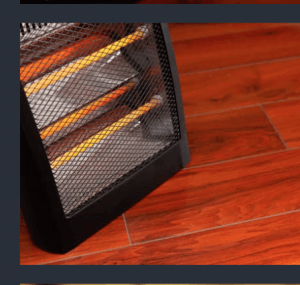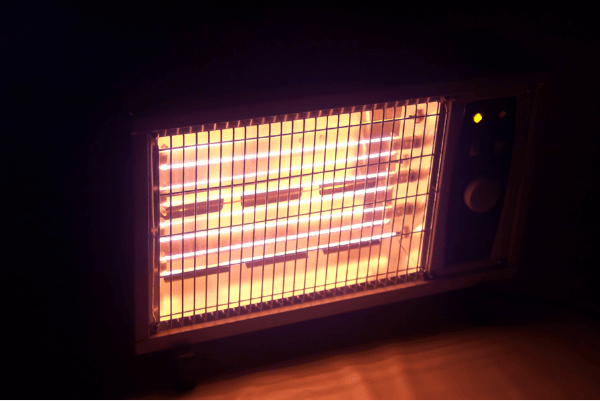According to the National Fire Protection Association, space heaters are the cause of a third of all winter house fires. Fire Departments around the country roll out a similar message each year as the cold weather arrives and lingers: Use greater fire safety caution with home heating equipment.
Senior safety advice notes that you should never use an oven to heat the home. They also note that you should keep flammables away from heat sources and get your chimney inspected each year. And rising to the top of their list of hazards: “Portable heaters can be particularly dangerous.” Using a space heater should be coupled with essential fire prevention safety practices.
Should I Be Worried About a Space Heater Fire?
Absolutely. The US Department of Energy records about 25,000 house fires every year that are linked to a space heater fire. Many result in trips to the emergency room, with more than 300 fatalities each year. Property damage from these fires can be devastating, requiring extensive professional fire damage restoration.
Why Do Space Heaters Cause Fires?
When used correctly, electric shock hazards associated with space heaters are greatly diminished. But when you’re in an environment with water or moisture buildup (like a bathroom), the potential for electric shock increases, leading to space heater fires.
Electrical safety should be promoted where children are present so they firmly understand, “never put a fork or other metal near that.” And where too much power is demanded from an outlet, or worse, a power strip, the potential for a surge, spark, smoking, burns, electric shock and fires get elevated.
How do Space Heaters Cause Fires?
The most common reasons space heater fires get started include:
- Flammables like curtains or blankets were too close to the portable heating unit and caught fire.
- The Space Heater did not have a Safety Auto Shut Off function and malfunctioned when left on too long OR the unit tipped over and then ignited the floor or nearby flammable materials.
- The heater was plugged into a power strip that a) melted, causing a live wire to touch carpet and ignite it, b) overloaded the circuits, sparked and lit a fire, c) was used in a wet area, sparked and caused a fire.
- The space heater was not properly maintained and developed worn, faulty or torn wires that resulted in a spark and fire.
Preventing Space Heater Fire Hazards

Put safety first and implement the following safety plan to better prevent space heater fire hazards:
Choose the Correct Size for Your Space
“Do not purchase oversized heaters.” That’s the warning from the US Department of Energy. Large, powerful heaters used for smaller spaces increase fire risk. The general rule for sizing heating equipment: for about every 200 square feet of well-insulated property, you’ll need about 4,000 BTUs (approx. 1,200 Watts) of power in your system. You may require more electrical power for poorly insulated spaces.
Read the Manual and Warning Labels – They Matter
Read the safety labels on your portable space heater. It should provide specifics to that unit. It’s also important to verify that the equipment has undergone and passed an inspection process, often citing a testing lab.
Use Cables, Cords & Outlets Properly – No Shortcuts
Pay attention to safety features and how you are using cords, plugs and outlets:
- Inspect the plugs and cords for damage – Especially important for the first use each season of new or refurbished space heaters. Be on the lookout for damaged or worn materials – which are flammable and combustible. Make sure there is a firm connection to the unit without any fraying.
- Plug space heaters directly into the wall – In other words, avoid power strips and extension cords. That’s because most extension cords and strips are not designed to take on the amount of electricity demanded by portable heaters. The Missouri Office of the State Fire Marshall adds, “If an extension cord is necessary, use the shortest possible heavy-duty cord of 14-gauge wire or larger.”
- Most Smart Plugs Are Now Equipped to Handle Space Heaters – Most of the higher end smart plugs handle more than enough power coming from your space heater. They also provide a great way to schedule power off functions or remote use to power off when you forget, but as a general rule it’s still best to turn your space heater on and off manually, and just plug them directly into the wall.
- Choose a Dedicated Outlet – Many manufacturers recommend not plugging any other electrical devices into the same outlet as the space heater. Just dedicate that one outlet to space heater use only.
- Don’t bury cords under rugs – It may be convenient to run that cord under a carpet, but these areas quickly build heat.
- Unplug the unit when not in use – Space heaters should not run overnight and should not be left on when the room is vacant. Take time to unplug the power cord after each use — a small habit that could prevent fire.
“To prevent the risk of fire, NEVER leave a space heater on when you go to sleep or place a space heater close to any sleeping person. Turn the space heater off if you leave the area.” – US Consumer Product Safety Commission
Use The Portable Heater in a Safe Location

Choosing a safe location to operate the space heater means paying attention to surrounding objects, traffic and water hazards. Here are some location tips to keep in mind:
- Avoid wet or typically humid spaces like bathrooms or areas where flammable and combustible liquids may be.
- Aim for a distance of at least three feet from any space heater (or other heat source) for curtains, blankets, books, papers and anything else that can burn. Even walls can get too hot, so give that space heater some room to work.
- Space heaters belong on flat surfaces that are level, so avoid tables, furniture, carpet and rugs and aim for concrete, tile or hardwood floors.
- Be sure to never block doorways or escape routes and avoid high traffic areas where they may pose a tripping hazard.
- Pets and children should always be supervised around space heaters and not left attended.
Remember that portable heaters are only intended to provide heat to a specific area. They should never be used to dry clothing or other tasks for which they were not designed.
Use Space Heaters Sparingly – Not for the Entire Season
Space heaters perform a valuable service, but were not designed to operate for long periods of time. Doing so increases the risks of overheating and short circuiting. If you’re continuing to use portable heaters to do the job that really should be accomplished by a reliable HVAC system, it’s probably time to consider alternatives to space heaters that provide warmth to targeted areas within your home.
Are Space Heater Fires Covered by Insurance?
House fires are included in dwelling as well as personal property coverages. However, the amount of money you receive for your claim is determined by the coverage limits. If the fire damage was caused by your space heaters and the costs exceed your insurance company’s coverage limits, then you must pay for the remaining expenses out of pocket.
Oil and Gas Space Heater Safety
If you’re not plugging in your space heater in a wall outlet and using electricity, pay close attention to portable heaters that use oil, kerosene or gas. When not used properly, or when they potentially malfunction, the risk of carbon monoxide poisoning increases.
Protect yourself, family and pets from home fires by using regularly tested smoke alarms and carbon monoxide monitoring systems. These save your properties and lives.
Learn more about preventing electrical fires in your home.
Frequently Asked Questions
How long can space heaters be left on?
Even though engineers have put in better safety measures during this recent year, it is still a general recommendation to turn off space heaters before you go to bed. They are still considered potential fire hazards.
Can you put a space heater on carpet?
Space heaters should never be placed on anything that can overheat and start a fire, including carpe, cabinets, furniture, and tables.
They should be placed on level, flat surfaces.
Can I plug a space heater into a smart plug?
There are no specific safety warnings that prevent the use of space heaters with smart plugs, although it’s certainly not something that safety organizations would recommend. Typically they recommend plugging directly into an outlet, but that’s primarily to stop people from using extension chords and cheap power strips.
Plugging your heater into a smart outlet isn’t inherently dangerous and you can do it. They can handle the load. It’s still probably smart to turn your heaters on and off manually, but you can use a smart outlet if you want to.
Can you leave a space heater on all night?
As mentioned above, you should never go to sleep with a space heater on or use one near a sleeping person.
Do space heaters need to be cleaned?
Yes, they do need to be cleaned. Space heaters are made up of metal parts, which means they can rust. If your heater has been sitting for a long time, then it may require some cleaning.
Can you leave a kerosene heater on all night?
Kerosene heaters should not be left unattended. Kerosene, as any other organic fuel can produce deadly amounts of soot and carbon monoxide when running out in oxygen– this could result to asphyxiation or carbon monoxide poisoning.
Can you use a space heater to dry a wet carpet?
Yes, you can use a space heater to dry a wet carpet. However, be careful not to place the space heaters in areas that are saturated with moisture.
Can electric baseboard heaters cause fires?
Electric baseboard heaters are safe to use. However, you must keep them away from flammable materials to avoid fires.
Are space heaters dangerous?
Space heaters can pose potential risks if not used properly. They have the potential to cause fires if placed too close to flammable materials or left unattended. Additionally, using extension cords that are not rated for the heater’s power can increase the risk of overheating and electrical hazards. It’s crucial to follow manufacturer guidelines.
Can you put a Space Heater on a Table?
You should not place your space heater on a table or other piece of furniture. An accidental bump might cause the heater to fall onto the floor, resulting in a fire hazard.
